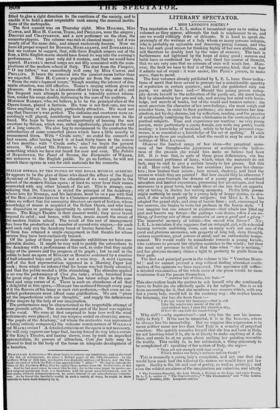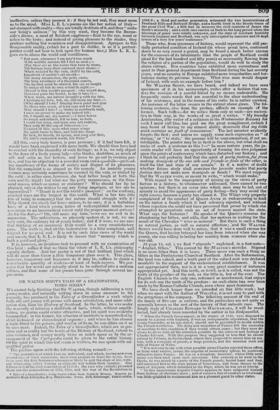MISS LANDON'S POETRY.* LITERARY SPECTATOR.
THE reputation of L. E. L. makes it incumbent upon us to notice her volumes as they appear, although the task is unpleasant to us, and one we would willingly defer or delegate. It is hard to speak dis- praisingly of the writings of a lady whom so many persons eulogize, who is probably an agreeable and deserving young woman, and who has had such good reason for thinking highly of her own abilities, and will therefore be doubly hurt by the voice of censure. The task is furthermore not lightened by the hope of doing good ; success and habit have so confirmed her style, and fixed her course of thought, that we are very sure that no censure of ours Will reach her. More- over, the fault we have to find is of that sweeping kind, that we fear it admits not of repair : it were easier, like POPE'S person, to make anew, than to mend.
The four volumes already published by L. E. L. have those indica- tions of merit that have served to procure her'a considerable quantity of reputation in certain quarters ; and had she published only one poem, we might have said—" Should this young person unhap- pily devote herself to the cultivation of the poetic art, she must begin first by abandoning her pen and ink, and storing her mind with know- ledge, not merely of books, but of the world and human nature : she must ascertain the character of her own feelings ; she must weigh and consider them, in order to their guidance; she must nurture her ima- gination, not by day-dreams, but by reflection, reading, and the practice of continually combining the ideas which:arise in the contemplation of poetical subjects. Time and experience are wanting : no very young person, more particularly a young female, can write any poetry worth reading: a knowledge of mankind, solely to be had by personal expe- rience, is as essential as a knowledge of the art of spelling." If such precepts as these are neglected, what the result is may be seen in the writings of Miss LANDON.
Observe the limited range of her ideas—the perpetual same- ness of her thought—the jejuneness of sentiment—the hollow- ness of the passion she would fain make us believe had been felt. It is true that, in spite of these gross deficiencies, she has an occasional prettiness of fancy, which, when the materials do not lack, may be said to give a certain beauty to her poems. But this is all. How cold, how lifeless, her creations : how poor her charac- ters ; how limited their action ; how unreal, shadowy, and faint the scenes in which they are painted! But how should they be otherwise ? What can pass through the dreams of a young person, of confined education and limited experience, possessing few advantages, and bred moreover in a great town, but such ideas as she has had an opportu nity of taking in during her waking moments. Pretty little poems might certainly be made up by a young lady of happy genius, so situ- ated, if she selected pretty little subjects ; but Miss L. E. L. has adopted the grand style, and aims at heroic fame ; and, encouraged by
her success, she begins to write her prefaces in the heroic style. " I can imagine but one interest in existence—that which has filled my past and haunts my future—the perhaps vain desire, when I am no- thing, of leaving one of those memories at once a good and a glory.- The immortal memory of initials—the sacred tria Werra! No; L. E. L. is mistaken if she supposes that an untaught girl, with a decided leaning towards scribbling verse, can so easily work out one of the good and glorious memories, sole property of long toil, deep thought, various experience, great powers of mind, and an enthusiastic tempe- rament. We would really be considerate towards a young female, who ventures to present her sibylline scratches to the world ; but then she must not presume to talk of that time when " she is nothing,- and her glorious memory shines a light to posterity to guide them on their path.
The first and principal poem in the volume is the " Venetian Brace- let ;" and we cannot proceed a step without finding abundant confir- mation of the opinions we have expressed. One specimen will suffice : a detailed examination of the whole even of one poem would be more wearisome than the poems themselves.
" Another tale of thine, fair Italic !"
This observation leads the poetess to ask herself why she continually turns to Italie (as she affectedly spells it) for subjects. She is so far from accounting for it, that she mentions two reasons which, with any but a young lady, would tell in the contrary way : she neither knows the language, nor has she been there :-
" I do not know thy language—that is still Like the mysterious music of the rill. And neither have I seen thy cloudless sky, Where the sun halls his immortality."
Why still?—why mysterious?—and why has the sun his immor- tality in Italy ? If the sun be immortal, it is in the heavens, where he always has his immortality. But we suppose this expression is to mean neither more nor less than that Italy is a country of perpetual sunshine. She quickly consoles herself that she has not been in Italy, for not knowing what it is, she is at liberty to make anything of it she likes, and needs be at no pains about making her painting resemble the reality. This reality is, in her estimation, a thing grievously to be complained of : speaking of her notion of Italy, she says- " Thou art not stamp'd with that reality Which makes our being's sadness and its thrall."
This is assuredly a young lady's complaint, and not one that she would have made had she followed the course we would have put her upon. Reality is the life and soul of poetry, as well as painting ; and even the wildest creations of the imagination are valueless, and utterly * The Venetian Bracelet, the Lost Pleiad, a History of the Lyre, and other Poems. By L. B.L. author of " The Improvisatriee," "The Troubadour," and "The Golden Violet." London, MO, Longman and Co. Till feelings keep their outward show alone)— The long avoidance of a thousand snares, of Ireland, with such an example before him ?
To image all but its own actual thought; ,
io those who scorn, at least care not for them: Why should I hate? as blades in scabbards melt,
They only fill the cup of bitterness.:)—
Wearied of this, upon what eager wings
crooked ways are the longest in this world. What is her fate (the right course, because a party has chosen it. The Whigs very properly
fate of being in company) that her nature should struggle with it ? complained of the conduct of Queen ANNE in endeavouring to foist Why should she check her love—unless, to be sure, it is a forbidden on the nation a family which it had solemnly rejected, and without
love, of a kind which young ladies of well-regulated. minds never whose rejection she could not have possessed that power by which she
encourage to an inconvenient extent until the proper moment arrives ? attempted to perpetrate such an act of treason against the state. As for the hate,—" Oh, still more my hate,"—we see no evil in its What says the historian ? He speaks of the Queen's remorse for repression. The unkindness, so piteously spoken of, is not, we are abandoning her father, and adds, that her motives in wishing for the very sure, the ordinary lot of young ladies; and if it were, we are sure recall of the Chevalier " were so natural." But there is such a thing that thinking of an imaginary Italy would be a very unsatisfactory as natural justice, as well as natural affection; :and Sir WALTER cure. The truth is, that all this lamentation is a false complaint, and SCOTT would have done well to notice, that it was a small excuse for feigned for no good end. It is not by such false views of the world the Queen, that having betrayed her king from interest when she was and society that L. E. L. is likely to secure that "memory which is was old.
both a good and glory." v
this kind : suffice it that we think the whole of L. E. L's. philosophy "Anglia:, tithes." This cannot be Sir iWALTERS mistfike. Stipend
equally shallow. And her poetry is not of that brilliant kind which is no more tithes than it is taxes. There never was such a thing as will do more than throw a little temporary glare over it. This glare, tithes in the Presbyterian Church of Scotland. After the Reformation, however, temporary and fueacions as it may he, suffices to dazzle a • the land was valued, and a tenth part of the valued rent was declared
considerable quantity of readers,at least of hook-buyers. We per- available to the support of the ecclesiastical establishment. It was ceive that her works are actually about to be collected into a uniform not appropriated then, nor is it in a very great number of instances edition, and that some of her poems have gone through several im- appropriated yet. And this tenth, or teind, as it is called, was not the



















 Previous page
Previous page